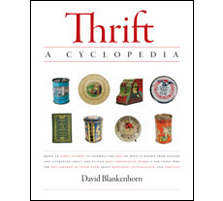
hrift
is America’s forgotten virtue. That is the contention of David Blankenhorn,
of the Institute for American Values, who has conducted a two-year multidisciplinary
project researching the idea, language and practice of thrift, supported
by the Templeton

Foundation.

“It’s been a recovery of part of the American tradition, part of American
history, that has almost entirely been neglected by historians and social
analysts,” says Blankenhorn. The predominant attitude of the academy
towards this important social ethic, he claims, is indifference, aggravated
by lack of knowledge of the subject.

The first phase of the project was to commission 24 research papers from
participating scholars. Although this objective was achieved and the
completed papers are now being considered for publication as a three-volume
set, Blankenhorn was dissatisfied with the focus of the earlier research.

He recalibrated the entire project, therefore, bringing together a small
cadre of enthusiasts to do more specialized research, starting with the
basics. “We’ve now assembled a team that’s passionately interested in
it, completely enthusiastic about the possibilities of this kind of work.”
Beginning with the etymology of the word “thrift,” they traced its evolution,
branching out into consideration of the main thinkers who have argued
for or against thrift, progressing to study social institutions, and
finally examining the realm of social movement.

“That’s where we are now,” says Blankenhorn. “We now have a number of
high quality products coming out.” These outcomes include a book he has
written himself called,
Thrift, to be published by the Templeton
Press, plus an exhibition on the history of thrift. There is also a book
of additional essays, based on the later, more focused research, with
the working title,
It’s a Wonderful Life, due to be published in late
2008.

What is the big question his team has been addressing? “We begin with:
What is thrift? Because it’s a contentious term, it’s often defined by
those who don’t like it. It has fallen out of the public conversation,
but it is a venerable word. Chaucer used it. It’s a very old English
word.”

Does thrift have a spiritual dimension? “Absolutely. The spiritual dimension
of thrift is central because, if you peel it back, thrift is really an
attempt to use somewhat secular language to rearticulate a doctrine which,
in religious traditions, is called stewardship. The central idea is that
what we have is not ours alone, that we are stewards of gifts that are
not our personal property … and we hold these gifts in trust and have
moral obligations to treat them with respect and pass them on.”

His findings show that this religious principle, articulated by John
Wesley and others, was secularized by Benjamin Franklin and similar lay
thinkers in the 18th century, so that it became the concept of the common
good rather than a gift of God. This program’s historical survey of thrift
has included research into institutions such as credit unions, building
societies, public libraries, and community parks.

But, whatever their historical virtues, contemporary Americans do not
emerge as thrifty. “Of the three dimensions of thrift that we have come
up with—industry, frugality, and trusteeship—Americans do well in hard
work, but not the other two categories.” Because of the credit crisis,
Americans are once more adopting attitudes of thrift, but are doing so
out of necessity. True thrift, insists Blankenhorn, “is more of a voluntary
practice, it’s a virtue, it’s a discipline, it’s a good thing—you don’t
just do it grudgingly, you do it because you know that this leads to
good outcomes for you.”

There has already been a conference to discuss the program’s early research
papers. The final conclusions of the project were presented in a report
to the nation and released at a press event in Washington, D.C. on May
13, 2008. Blankenhorn brings a missionary zeal to his determination to
reintroduce the topic of thrift into public discourse in America and
he is proud of the contrarian stance his team has taken, against contemporary
fiscal orthodoxy, to promote what he calls “this against-the-grain recovery
of something that’s been ignored and disdained.”

The times may be favorable to his endeavor, with economic recession concentrating
minds. “There’s a sense of the need for sobriety in our national fiscal
affairs.” The current difficulties could encourage Americans to cultivate
once again a virtue that their ancestors embraced intuitively. As Blankenhorn
says, “It’s actually the pathway to thriving.”



 hrift
is America’s forgotten virtue. That is the contention of David Blankenhorn,
of the Institute for American Values, who has conducted a two-year multidisciplinary
project researching the idea, language and practice of thrift, supported
by the Templeton
hrift
is America’s forgotten virtue. That is the contention of David Blankenhorn,
of the Institute for American Values, who has conducted a two-year multidisciplinary
project researching the idea, language and practice of thrift, supported
by the Templeton  Foundation.
Foundation.